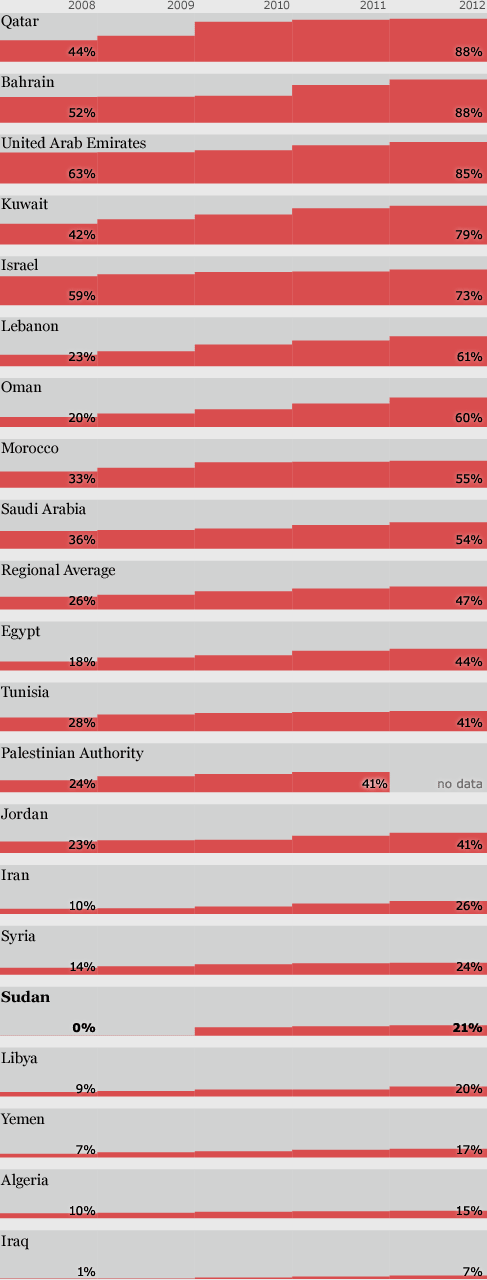Despite official promises to end the practice of pre-publication censorship, agents of the Sudanese National Intelligence and Security Services continued to intimidate journalists and censor newspapers. Security service officials routinely ordered papers to be suspended and raided printing houses to confiscate certain issues. At least 14 journalists were arrested over the year, many for their coverage of anti-government protests prompted by economic austerity plans that swept the country in September. After the wave of protests, in which more than 700 citizens were arrested, the Sudanese government ordered editors to publish news in line with official statements and to portray protesters as “vandals.” Foreign media outlets were also targeted and told that their licenses would be scrapped, according to reports. The Sudanese government shut down Internet service twice to prevent protesters from using social media.
Sudan
» National Intelligence and Security Services intimidate and arrest journalists.
» The government shuts down the Internet to restrict coverage of protests.
Despite official promises to end the practice of pre-publication censorship, agents of the Sudanese National Intelligence and Security Services continued to intimidate journalists and censor newspapers. Security service officials routinely ordered papers to be suspended and raided printing houses to confiscate certain issues. At least 14 journalists were arrested over the year, many for their coverage of anti-government protests prompted by economic austerity plans that swept the country in September. After the wave of protests, in which more than 700 citizens were arrested, the Sudanese government ordered editors to publish news in line with official statements and to portray protesters as “vandals.” Foreign media outlets were also targeted and told that their licenses would be scrapped, according to reports. The Sudanese government shut down Internet service twice to prevent protesters from using social media.
Sudanese authorities shut off access to the Internet twice in 2013, according to news reports. In June, access was blocked for about eight hours ahead of a political rally, and in September, Internet service was restricted after riots erupted in northern Khartoum over the ending of fuel subsidies.
With only 21 percent of Sudanese citizens online, Internet penetration in Sudan falls below the regional average, according to the International Telecommunication Union.

At least 14 journalists were detained at least briefly by authorities over the year, according to local journalists and news reports. Several of the journalists said they had been threatened and assaulted before being taken into custody.
June 29, 2013 | Michael Gunn, a Bloomberg correspondent working in Sudan, tells CPJ that he was covering an opposition party meeting when he was grabbed by police agents in plain clothes and taken to an unidentified building. He says he was blindfolded, slapped several times, ordered to unlock his smartphone, and interrogated about his activities in Sudan. He was released after three hours, he says. |
September 27, 2013 | Okail Ahmed Naem, a reporter for Ahram Today, is detained while covering protests in Khartoum, according to news reports. He is released the next day. |
September 30, 2013 | The police detain Sami al-Shinawy, a correspondent of Dubai TV, for four hours while he is covering a protest, according to news reports. |
Sudanese authorities banned the independent daily Al-Jareeda at least nine times in 2013, according to news reports. The paper had reported critically on government policies and covered the protests set off by economic austerity plans.
The government briefly suspended several papers over the year in connection with the papers' coverage of anti-government protests.
Al-Midan
Al-Tayar
Al-Meghar Alseyasi
Akhir lahza
Al-Wan
Al-Ahram Today
Al-Watan
Al-Ahdath
Al-Wafaq
Alray Alaam
Al-Sudany
Al-Qararr
Al-Mashhad
Al-Intibaha
The local group Journalists for Human Rights in Sudan reported that in 2013, agents of the National Intelligence and Security Services ordered newspapers to ban articles by at least six journalists in connection with the reporters’ critical coverage.
The papers complied to avoid being shut down.
Mohamed Latif | Al-Khartoum |
Zuhair al-Sarraj | Al-Jarida |
Mohamed Abdel Majid | Al-Ahram Today |
Salah Odeh | Akhir Lahza |
Haider al-Mkashva | Al-Taghiar |
Sadiq al-Ansari | Al-Qararr |
